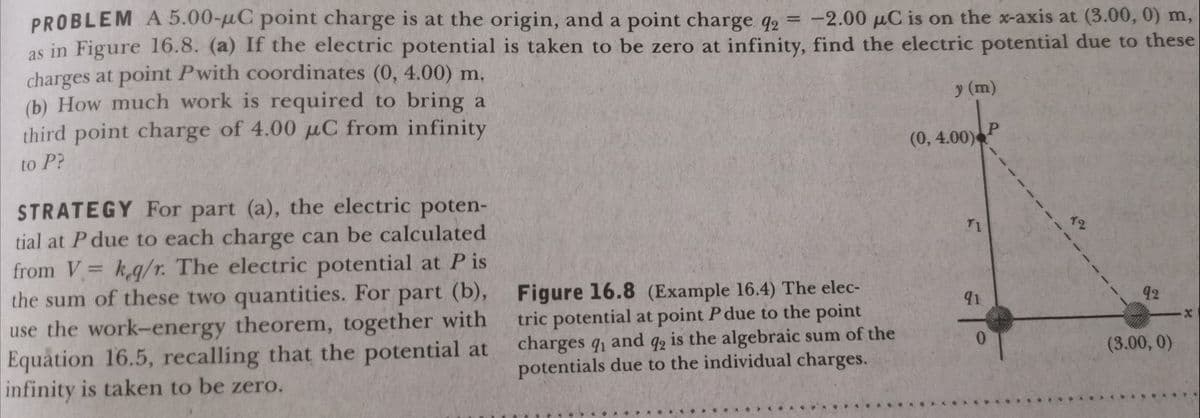PROBLEM A 5.00-uC point charge is at the origin, and a point charge q2 = -2.00 µC is on the x-axis at (3.00, 0) m, as in Figure 16.8. (a) If the electric potential is taken to be zero at infinity, find the electric potential due to these charges at point Pwith coordinates (0, 4.00) m, (b) How much work is required to bring a third point charge of 4.00 uC from infinity y (m) to P? (0, 4.00) STRATEGY For part (a), the electric tial at P due to each charge can be calculated from V kg/r. The electric potential at P is the sum of these two quantities. For part (b), use the work-energy theorem, together with Equation 16.5, recalling that the potential at infinity is taken to be zero. poten- 71 Figure 16.8 (Example 16.4) The elec- tric potential at point P due to the point charges q and q, is the algebraic sum of the potentials due to the individual charges. 41 92 (3.00, 0)
PROBLEM A 5.00-uC point charge is at the origin, and a point charge q2 = -2.00 µC is on the x-axis at (3.00, 0) m, as in Figure 16.8. (a) If the electric potential is taken to be zero at infinity, find the electric potential due to these charges at point Pwith coordinates (0, 4.00) m, (b) How much work is required to bring a third point charge of 4.00 uC from infinity y (m) to P? (0, 4.00) STRATEGY For part (a), the electric tial at P due to each charge can be calculated from V kg/r. The electric potential at P is the sum of these two quantities. For part (b), use the work-energy theorem, together with Equation 16.5, recalling that the potential at infinity is taken to be zero. poten- 71 Figure 16.8 (Example 16.4) The elec- tric potential at point P due to the point charges q and q, is the algebraic sum of the potentials due to the individual charges. 41 92 (3.00, 0)
College Physics
10th Edition
ISBN:9781285737027
Author:Raymond A. Serway, Chris Vuille
Publisher:Raymond A. Serway, Chris Vuille
Chapter16: Electrical Energy And Capacitance
Section: Chapter Questions
Problem 18P: A positive point charge q = +2.50 nC is located at x = 1.20 m and a negative charge of 2q = 5.00 nC...
Related questions
Question
Explain and show complete solution. Label the formulas used. Use 3 decimal places for the final answer.

Transcribed Image Text:PROBLEM A 5.00-uC point charge is at the origin, and a point charge q, = -2.00 µC is on the x-axis at (3.00, 0) m,
as in Figure 16.8. (a) If the electric potential is taken to be zero at infinity, find the electric potential due to these
charges at point Pwith coordinates (0, 4.00) m,
(b) How much work is required to bring a
third point charge of 4.00 µC from infinity
%3D
y (m)
(0,4.00)
to P?
STRATEGY For part (a), the electric poten-
T1
12
tial at P due to each charge can be calculated
from V= k,g/r. The electric potential at P is
the sum of these two quantities. For part (b), Figure 16.8 (Example 16.4) The elec-
use the work-energy theorem, together with
Equation 16.5, recalling that the potential at
infinity is taken to be zero.
91.
92
tric potential at point P due to the point
charges q and q, is the algebraic sum of the
potentials due to the individual charges.
(3.00, 0)
Expert Solution
This question has been solved!
Explore an expertly crafted, step-by-step solution for a thorough understanding of key concepts.
Step by step
Solved in 3 steps with 3 images

Knowledge Booster
Learn more about
Need a deep-dive on the concept behind this application? Look no further. Learn more about this topic, physics and related others by exploring similar questions and additional content below.Recommended textbooks for you

College Physics
Physics
ISBN:
9781285737027
Author:
Raymond A. Serway, Chris Vuille
Publisher:
Cengage Learning

Physics for Scientists and Engineers, Technology …
Physics
ISBN:
9781305116399
Author:
Raymond A. Serway, John W. Jewett
Publisher:
Cengage Learning

Principles of Physics: A Calculus-Based Text
Physics
ISBN:
9781133104261
Author:
Raymond A. Serway, John W. Jewett
Publisher:
Cengage Learning

College Physics
Physics
ISBN:
9781285737027
Author:
Raymond A. Serway, Chris Vuille
Publisher:
Cengage Learning

Physics for Scientists and Engineers, Technology …
Physics
ISBN:
9781305116399
Author:
Raymond A. Serway, John W. Jewett
Publisher:
Cengage Learning

Principles of Physics: A Calculus-Based Text
Physics
ISBN:
9781133104261
Author:
Raymond A. Serway, John W. Jewett
Publisher:
Cengage Learning


Physics for Scientists and Engineers: Foundations…
Physics
ISBN:
9781133939146
Author:
Katz, Debora M.
Publisher:
Cengage Learning

College Physics
Physics
ISBN:
9781305952300
Author:
Raymond A. Serway, Chris Vuille
Publisher:
Cengage Learning